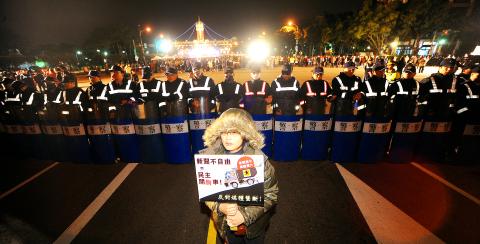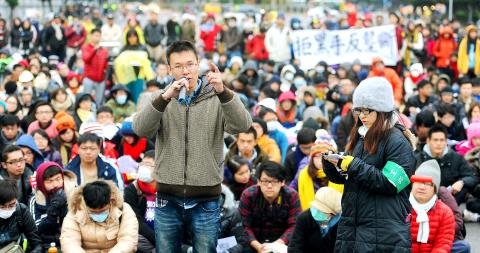Hundreds of university students voiced their disappointment and anger over President Ma Ying-jeou’s (馬英九) continued silence over their anti-media monopoly appeal following an overnight vigil yesterday and vowed to keep on pressing the president for a response and action on an issue that risks undermining freedom of speech in the nation.
The students launched the protest on 7pm on Monday at Liberty Square, followed by a sit-in protest starting at 4am yesterday on Ketagalan Boulevard, right outside the restricted area for the New Year’s Day flag-raising ceremony. They demanded that the president clarify his position on the controversial Next Media Group (壹傳媒集團) deal and address related issues on media monopoly and Chinese influence over Taiwan’s media.
However, Ma did not say a single word about the students’ concern about media monopoly in his New Year’s Day address.

Photo: Liu Hsin-de, Taipei Times
In their fifth protest over the media deal since July, the students braved the cold, with temperatures hovering around 10°C, and took turns making speeches about how the deal could jeopardize media diversity and, for the first time, listed their concern over growing Chinese influence on Taiwan’s media as a primary cause of the protest.
Sitting in front of hundreds of police equipped with riot shields, the crowd chanted slogans, such as “Anti-media monopoly,” “Ma Ying-jeou, declare your position” and “Anti-Beijing interference” before concluding the protest at 8:30am.
Lin Fei-fan (林飛帆), leader of the Youth Alliance Against Media Monsters, the organizer of the protests, announced five demands: that Ma should pledge that he is against media monopoly and initiate concrete measures to stem rising Chinese influence; that the Chinese Nationalist Party (KMT) should not block amendments to media regulatory bills; that Fair Trade Commission should hold a legally binding public hearing; that the Investment Commission should clarify whether the consortium applying to purchase the Next Media Group should be considered foreign investors; and that the government should disclose all information about the deal and ensure transparency.

Photo: Liu Hsin-de, Taipei Times
“If the government fails to make substantial progress [on these issues], we will keep coming back,” Lin said.
The students have received strong support from university professors and civic groups. More than 600 professors across the country had signed a petition in support of their cause and several professors attended the protests and spoke with the students. National Taiwan University professor Chang Chin-hwa (張錦華) condemned what he called Ma’s silence on the issue and refusal to listen to the people, while Academia Sinica researcher Wu Ruei-ren (吳叡人) said: “Ma has to choose between the good and the evil, and he will be ultimately judged by Taiwanese and history.”
Prior to the sit-in, the students gathered at Liberty Square for a night rally, which was filled with songs and speeches. They staged their own year-end countdown, to the tune of The Final Countdown, a 1980s hit by the rock band Europe, to rival the countdown party at Taipei’s Xinyi District (信義).
In related news, Taiwanese singer-songwriter Deserts Chang (張懸) praised Wu Ching-feng (吳青峰), the lead singer of the popular band Sodagreen (蘇打綠), in a Facebook post, after the latter voiced his opposition to media monopoly on stage during his New Year’s Eve live performance at the E-da World theme park in Greater Kaohsiung.
However, Wu’s remarks were removed from the rerun aired by China Television Co, a television channel owned by pro-China Want Want China Times Group (旺旺中時集團), which was in charge of broadcasting the festivities.
“He [Wu] has always managed to achieve things that I couldn’t do or do well enough. I’m truly grateful for his ability to cleverly manage fame and to transform fame into a power that prevents him from being manipulated,” Chang wrote.
AdditIonal reporting by Lin Shu-hui

Auckland rang in 2026 with a downtown fireworks display launched from New Zealand’s tallest structure, Sky Tower, making it the first major city to greet the new year at a celebration dampened by rain, while crowds in Taipei braved the elements to watch Taipei 101’s display. South Pacific countries are the first to bid farewell to 2025. Clocks struck midnight in Auckland, with a population of 1.7 million, 18 hours before the famous ball was to drop in New York’s Times Square. The five-minute display involved 3,500 fireworks launched from the 240m Sky Tower. Smaller community events were canceled across New Zealand’s

The Ministry of Foreign Affairs (MOFA) yesterday said it is closely monitoring developments in Venezuela, and would continue to cooperate with democratic allies and work together for regional and global security, stability, and prosperity. The remarks came after the US on Saturday launched a series of airstrikes in Venezuela and kidnapped Venezuelan President Nicolas Maduro, who was later flown to New York along with his wife. The pair face US charges related to drug trafficking and alleged cooperation with gangs designated as terrorist organizations. Maduro has denied the allegations. The ministry said that it is closely monitoring the political and economic situation

‘SLICING METHOD’: In the event of a blockade, the China Coast Guard would intercept Taiwanese ships while its navy would seek to deter foreign intervention China’s military drills around Taiwan this week signaled potential strategies to cut the nation off from energy supplies and foreign military assistance, a US think tank report said. The Chinese People’s Liberation Army (PLA) conducted what it called “Justice Mission 2025” exercises from Monday to Tuesday in five maritime zones and airspace around Taiwan, calling them a warning to “Taiwanese independence” forces. In a report released on Wednesday, the Institute for the Study of War said the exercises effectively simulated blocking shipping routes to major port cities, including Kaohsiung, Keelung and Hualien. Taiwan would be highly vulnerable under such a blockade, because it

UNRELENTING: China attempted cyberattacks on Taiwan’s critical infrastructure 2.63 million times per day last year, up from 1.23 million in 2023, the NSB said China’s cyberarmy has long engaged in cyberattacks against Taiwan’s critical infrastructure, employing diverse and evolving tactics, the National Security Bureau (NSB) said yesterday, adding that cyberattacks on critical energy infrastructure last year increased 10-fold compared with the previous year. The NSB yesterday released a report titled Analysis on China’s Cyber Threats to Taiwan’s Critical Infrastructure in 2025, outlining the number of cyberattacks, major tactics and hacker groups. Taiwan’s national intelligence community identified a large number of cybersecurity incidents last year, the bureau said in a statement. China’s cyberarmy last year launched an average of 2.63 million intrusion attempts per day targeting Taiwan’s critical